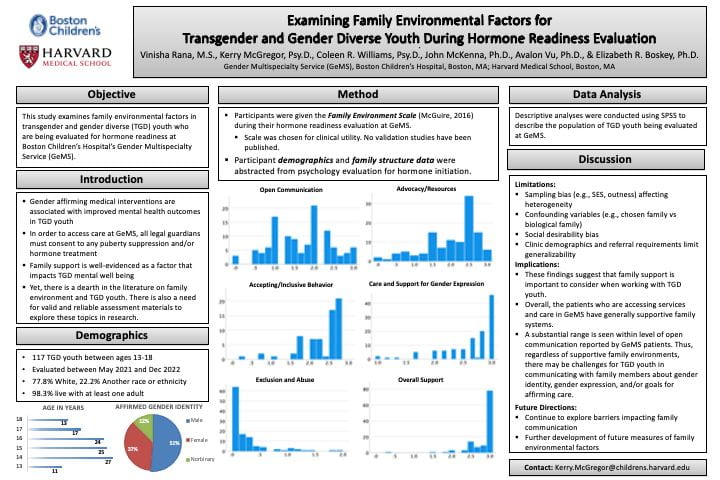Scientific Abstract
Background: It is well supported in the literature that affirming medical interventions are associated with improved mental health outcomes in transgender and gender diverse (TGD) youth. In addition, family support has been found to impact TGD mental well-being. Thus, exploring and understanding the family environment of TGD patients is important for providers who work with this population. There is a dearth in the literature on family environment and TGD youth. Therefore, this study examines family environmental factors in transgender and gender diverse (TGD) youth who are being evaluated for hormone readiness at Boston Children’s Hospital’s Gender Multispecialty Service (GeMS).
Methods: The sample consisted of 117 TGD youth between the ages of 13 and 18, who were evaluated by Gender Multispecialty Service (GeMS) of Boston Children’s Hospital between May 2021 and December, as part of the clinic’s standard clinical assessment for hormone readiness. Participants were given the Family Environment Scale (McGuire, 2016) during their hormone readiness evaluation at GeMS. The measure utilizes a likert scale and participants can respond to each item with non-applicable or 0 (never) to 3 (many times). Participant demographics and family structure data were abstracted from the psychology evaluation for hormone initiation. Descriptive analyses were conducted using SPSS to describe the population of TGD youth being evaluated at GeMS.
Results: In terms of race or ethnicity, 77.8% of the participants identified as white, whereas 22.2% identified as another race or ethnicity. 98.3% of the participants lived with at least one adult. The adult figure that the participant lived with that was identified the most was their mother. In terms of affirmed gender identity, 51% of the participants identified as male, 37% identified as female, and 12% identified as non-binary. The average score was 1.65 on the Open Communication Scale. The average score was 2.04 on the Advocacy and Resources Scale. The average score was a 2.58 on the Accepting and Inclusive Behavior Scale. The average score was 2.64 for Explicit Care and Support Scale. The average score was 0.21 for the Exclusion and Abuse Scale. The average score was 2.82 for the Overall Support Scale.
Conclusions: Overall, the patients who are accessing services and care in GeMS have generally supportive family systems. However, a substantial range is seen within level of open communication reported by GeMS patients. Thus, regardless of supportive family environments, there may be challenges for TGD youth in communicating with family members about gender identity, gender expression, and/or goals for affirming care.These findings suggest that family support is important to consider when working with TGD youth. It is important to continue exploring barriers impacting family communication. In addition, there is a need for future measures of family environmental factors to be developed and utilized in research with TGD youth.

